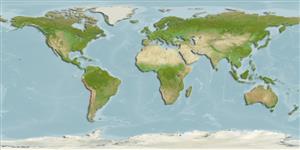| Native range | All suitable habitat | Point map | Year 2050 |

|
| This map was computer-generated and has not yet been reviewed. |
| Sarda chiliensis AquaMaps Data sources: GBIF OBIS |
Issue
Issue on validity of subspecies: subspecies considered as valid in FB, elevated to species rank as Sarda chiliensis (Cuvier, 1832) in Eschmeyer (CofF ver. May 2011: Ref. 86870).